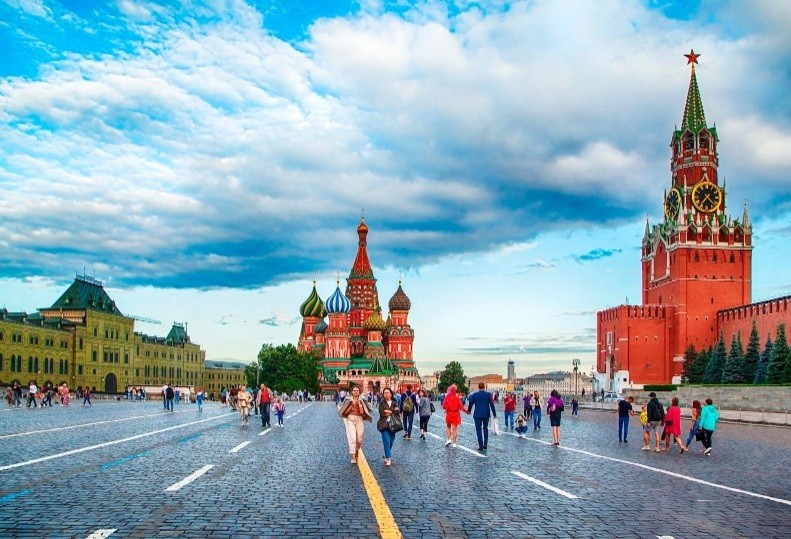 |
| After 1 year of staying in the Russian market, Western companies "won big" and earned billions of dollars in profits. (Source: Getty) |
Only 17% of Western companies leave Russia
New statistical report by the Kiev School of Economics (KSE) and B4Ukraine shows that multinational companies in Russia are continuing to pay taxes in this market in 2022.
By some estimates, maintaining its military efforts costs Russia at least $1 billion a day, a huge strain on its finances, while falling oil and gas prices and sanctions on Russia's energy sector are hurting the country's main source of income.
However, the report found that of the 1,387 Western companies that had subsidiaries in Russia at the start of the Russia-Ukraine conflict on February 24, 2022, only 241 (17%) had left Russia entirely. Meanwhile, those that had not left the market paid $177.2 billion in taxes last year.
In February, the KSE released an unfinished business report analyzing companies leaving Russia, saying that more than half (56%) of international companies operating in Russia when the conflict began continued to do business there. The report said that little had changed even three months into the conflict, with 56% of the companies monitored by the KSE still reporting staying in Russia.
Foreign companies pay billions of dollars in taxes
Global corporations, including those that have withdrawn from Russia, paid a total of $3.5 billion in taxes on profits in the country in 2022. The report said this was just the “tip of the iceberg” and likely underestimated the total tax bill.
The report also found that foreign companies with branches in Russia also have to pay a range of other taxes, including income tax on employee wages, social insurance contributions and value-added tax.
Companies headquartered in G7 and EU countries were the highest profit tax payers in Russia in 2022, with 16 of the top 20 multinationals contributing the most.
According to the report, US companies lead in terms of revenue in Russia and are the biggest contributors to the country's budget through profit taxes, amounting to $712 million in 2022, followed by German companies with $402 million. Meanwhile, companies based in current EU member states paid $594 million in profit taxes.
Many German companies have already left the Russian market or are in the process of doing so, said Michael Harms, executive director of the German Economic Committee for the Eastern Region. Speaking to DW , Harms said German-Russian economic relations have changed significantly.
In 2022, German exports to Russia fell by almost half, while imports from Russia fell by 90% since the beginning of 2023.
The reality is that this figure will not be fully reflected in the 2022 statistics, according to Mr. Harms, because many companies are bound by contractual obligations and cannot leave the market immediately. The Russian government has also set up significant barriers to make it more difficult for foreign companies to withdraw, he said.
Many brands remain
While some brands like McDonald's and Starbucks are leaving Russia altogether, many others are staying put.
The KSE report shows that some tobacco giants such as Japan Tobacco International achieved revenue of $7.4 billion in Russia in 2022, up $1.5 billion from 2021, the largest increase of any company, and the company paid $193 million in profit tax in 2022.
 |
| Tobacco company Philip Morris International continues to do well in the Russian market. (Source: PMI) |
Phillip Morris, which had $7.9 billion in revenue and paid $206 million in corporate income tax in Russia in 2022, said in February that it would be more profitable to continue doing business in Russia than to sell its products at lower prices.
The consumer goods sector is expected to generate $21 billion in revenue in Russia by 2022. Multinational food company Danone alone has more than $3 billion in revenue, and although it is actively looking for a Russian entity to sell its entire operations there, it has so far been unsuccessful. Nestle has also recently cut some of its operations and stopped advertising in the Russian market.
US confectionery maker Mars was one of Russia’s biggest taxpayers in 2022, paying $99 million in corporate income tax. In January, Mars said it was winding down some of its Russian operations.
Source




![[Photo] Close-up of Tang Long Bridge, Thu Duc City after repairing rutting](https://vphoto.vietnam.vn/thumb/1200x675/vietnam/resource/IMAGE/2025/5/19/086736d9d11f43198f5bd8d78df9bd41)
![[Photo] General Secretary To Lam attends the conference to review 10 years of implementing Directive No. 05 of the Politburo and evaluate the results of implementing Regulation No. 09 of the Central Public Security Party Committee.](https://vphoto.vietnam.vn/thumb/1200x675/vietnam/resource/IMAGE/2025/5/19/2f44458c655a4403acd7929dbbfa5039)
![[Photo] President Luong Cuong presents the 40-year Party membership badge to Chief of the Office of the President Le Khanh Hai](https://vphoto.vietnam.vn/thumb/1200x675/vietnam/resource/IMAGE/2025/5/19/a22bc55dd7bf4a2ab7e3958d32282c15)
![[Photo] Panorama of the Opening Ceremony of the 43rd Nhan Dan Newspaper National Table Tennis Championship](https://vphoto.vietnam.vn/thumb/1200x675/vietnam/resource/IMAGE/2025/5/19/5e22950340b941309280448198bcf1d9)



























![[Photo] Prime Minister Pham Minh Chinh inspects the progress of the National Exhibition and Fair Center project](https://vphoto.vietnam.vn/thumb/1200x675/vietnam/resource/IMAGE/2025/5/19/35189ac8807140d897ad2b7d2583fbae)





























































![[VIDEO] - Enhancing the value of Quang Nam OCOP products through trade connections](https://vphoto.vietnam.vn/thumb/402x226/vietnam/resource/IMAGE/2025/5/17/5be5b5fff1f14914986fad159097a677)





Comment (0)